七年级英语上册 Unit 6 I’m watching TV单词、短语及重点句型 (新版)人教新目标版
人教版英语七年级上册 Unit 6 I'm watching TV知识点 素材
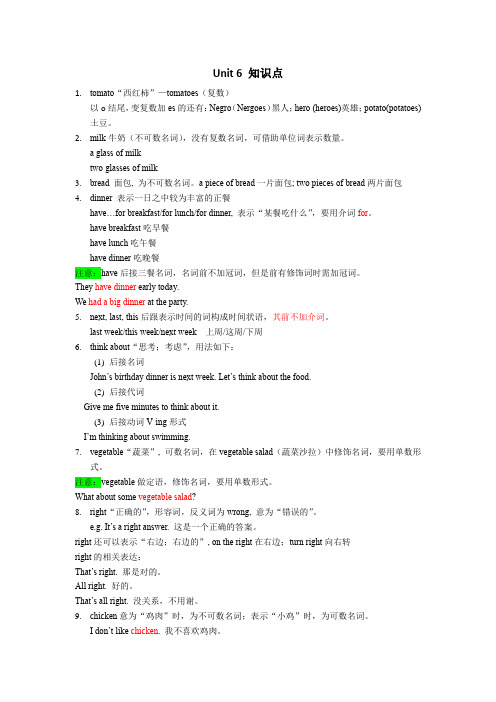
Unit 6 知识点1.tomato“西红柿”—tomatoes(复数)以o结尾,变复数加es的还有:Negro(Nergoes)黑人;hero (heroes)英雄;potato(potatoes)土豆。
k牛奶(不可数名词),没有复数名词,可借助单位词表示数量。
a glass of milktwo glasses of milk3.bread 面包, 为不可数名词。
a piece of bread一片面包; two pieces of bread两片面包4.dinner 表示一日之中较为丰富的正餐have…for breakfast/for lunch/for dinner, 表示“某餐吃什么”,要用介词for。
have breakfast吃早餐have lunch吃午餐have dinner吃晚餐注意:have后接三餐名词,名词前不加冠词,但是前有修饰词时需加冠词。
They have dinner early today.We had a big dinner at the party.5.next, last, this后跟表示时间的词构成时间状语,其前不加介词。
last week/this week/next week 上周/这周/下周6.think about“思考;考虑”,用法如下:(1)后接名词John’s birthday dinner is next week. Let’s think about the food.(2)后接代词Give me five minutes to think about it.(3)后接动词V-ing形式I’m thinking about swimming.7.vegetable“蔬菜”, 可数名词,在vegetable salad(蔬菜沙拉)中修饰名词,要用单数形式。
注意:vegetable做定语,修饰名词,要用单数形式。
What about some vegetable salad?8.right“正确的”,形容词,反义词为wrong, 意为“错误的”。
七年级英语 unit 6 i’m watching tv section a核心词汇

just /dʒʌst/ 只是、恰好 house /haʊs/ 房子 use /juːz/ 使用 -- using
---What are you doing now? ---Not much. I'm just cleaning the house. What about you? ---I'm using the computer.
I'm watching TV. Section A 核心词汇
use wash
just tomorrow
house
read a newspaper make soup go to the movies eat out drink tea
My father is reading a newspaper. newspaper /'njuːzpeɪpə(r)/ 报纸 read a newspaper 看报纸
movie /'muːvi/ 电影 go to the movies 去看电影 tomorrow /tə'mɒrəʊ/ 明天 eat out 出去吃饭
---Do you want to go to the movies with me tomorrow? ---Of course. Then we can eat out.
根据汉语意思或首字母提示完成句子
1. I'm thirsty. I want something to d_ri_n_k___. 2. My grandpa is __d_ri_n_k_in_g__te_a____. (喝茶) 3. I want __t_o__g_o_t_o_t_h_e_m__o_v_ie_s__.(去看电影)
My mother is making soup. soup /suːp/ 汤 make soup 做汤
unit6 I’m watching TV- 七年级英语下册同步必背知识清单(人教版)

Unit 6 I’m watching TV.七年级英语下册必备知识清单一、词汇知识清单I、课标词汇[注意英译汉]newspaper ['n.juːzpeɪpə] n.报纸read a newspaper看报纸use [juːz] v.使用;运用soup [suːp] n.汤make soup做汤wash [wɒʃ] v.洗movie ['muːvɪ] n.电影go to the movies看电影just [dʒʌst] adv.只是;恰好eat out出去吃饭house [haʊs] n.房子drink [drɪŋk] v.喝;n.饮料tea [tiː] n.茶;茶叶drink tea喝茶tomorrow [tə'mɒrəʊ] adv.在明天pool [puːl] n.(复数pools)游泳池shop [ʃɒp] v.购物supermarket ['suːpəmɑːkɪt] n.超市man [mæn] n.男人;人race [reɪs] n.竞赛host [həʊst] n.主人;东道主study ['stʌdɪ] v.&n.学习;研究state [steɪt] n.洲the United States [ði juˈnaɪtɪd stets] (of America) (abbr. the US, the USA )美国;美利坚合众国American [əˈmerɪkən] adj.美国的;美洲的;n.美国人;美洲人dragon ['dræg(ə)n] n.龙Dragon Boat Festival端午节any ['enɪ] adj.任何一个;任一的pron.任何;任一other ['ʌðə] adj另外的;其他的young [jʌŋ] adj.幼小的,年轻的child [tʃaɪld] n.儿童(pl. children ['tʃɪldrən])miss [mɪs] v.怀念.思念wish [wɪʃ] v.希望delicious [dɪ'lɪʃəs] adj.可口的,美味的still [stɪl] adv.还.仍然living room ['lɪvɪŋ ru:m]客厅II、语法词汇知其变[注意词性变化]1.arrive [ə'raɪv] v.到达---ing形式arriving---n.arrival到达,到来e [juːz] v.使用;运用---ing形式eful有用的;useless无用的eage使用;user用户3.wash [wɒʃ] v.洗---ing形式washing---adj.washable可洗的;耐洗的4.drink [drɪŋk] v.喝;n.饮料---ing形式drinking---adj.drunk喝醉了的---n.drinker酒徒5.shop [ʃɒp] v.购物---ing形式shopping---n.shopper购物者;顾客;shopaholic购物狂6.man [mæn] n.男人;人---pl.men7.child [tʃaɪld] n.儿童---pl.childrenIII、重点短语知搭配[注意固定短语的英汉互译]read a newspaper看报纸make soup做汤What are you/they doing? I'm /They're …你在做什么?我在/他们在……。
七年级英语上册u6知识点

七年级英语上册u6知识点【七年级英语上册u6知识点】Unit 6: I'm watching TV.本单元主要学习现在进行时态,即“be + V-ing”。
它表示正在进行的动作或状态,通常与时间状语连用。
一、现在进行时的构成现在进行时的构成是由助动词be和现在分词构成,其中,be 的形式根据主语的单复数和人称变化,现在分词保持不变。
下面是be的各种形式和现在分词的形式:be的各种形式:I amYou areHe/She/It isWe areYou areThey are现在分词的形式:V-ing举例:I am watching TV.We are playing basketball. They are eating lunch.二、现在进行时的用法1. 表示现在正在进行的动作或状态,通常与时间状语连用。
如:She is cooking dinner now.We are having a meeting at the moment.注意:当表示短暂的动作时,一般用现在进行时,如:He is reading a book.2. 表示计划或安排中的动作。
如:I am meeting my friend tomorrow.They are going to the cinema at 7 p.m.3. 表示反复发生的动作。
如:He is always talking in class.She is constantly checking her phone.三、现在进行时的否定句和一般疑问句1. 否定句的构成:be (am/is/are) + not + V-ing。
如:He is not playing football.They are not studying now.2. 一般疑问句的构成:Be (Am/Is/Are) + 主语 + V-ing + 其他?如:Are you watching TV?Is she playing basketball?注意:回答一般疑问句时,可以用yes或no来回答,同时用be动词的形式作为回答。
讲解Unit6I’m watching TV.
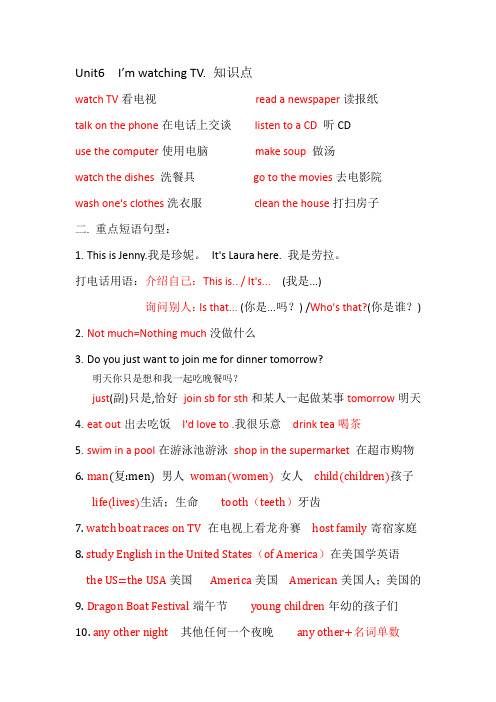
Unit6 I’m watching TV. 知识点watch TV看电视read a newspaper读报纸talk on the phone在电话上交谈listen to a CD听CDuse the computer使用电脑make soup做汤watch the dishes洗餐具go to the movies去电影院wash one's clothes洗衣服clean the house打扫房子二.重点短语句型:1.This is Jenny.我是珍妮。
It's Laura here. 我是劳拉。
打电话用语:介绍自己:This is.. / It's... (我是...)询问别人:Is that... (你是...吗?) /Who's that?(你是谁?)2.Not much=Nothing much没做什么3.Do you just want to join me for dinner tomorrow?明天你只是想和我一起吃晚餐吗?just(副)只是,恰好join sb for sth和某人一起做某事tomorrow明天4.eat out出去吃饭I'd love to .我很乐意drink tea喝茶5.swim in a pool在游泳池游泳shop in the supermarket在超市购物6.man(复:men) 男人woman(women)女人child(children)孩子life(lives)生活;生命tooth(teeth)牙齿7. watch boat races on TV 在电视上看龙舟赛host family寄宿家庭8. study English in the United States(of America)在美国学英语the US=the USA美国America美国American美国人;美国的9.Dragon Boat Festival端午节young children年幼的孩子们10. any other night其他任何一个夜晚any other+名词单数11. Zhu Hui misses his family and wishes to have his mom's deliciouszongzi.朱辉思念他的家并且希望吃到妈妈做的美味的粽子。
Unit6ImwatchingTV知识点总结

Unit6ImwatchingTV知识点总结Unit 6 I’m watching TV知识点总结1. 现在进行时:表示现在正在进行或发生的动作。
标志词:now, Look!Listen! It’s…o’clock . at the moment, right now…肯定句:主语+be+现在分词(be动词和ing,永远不分离!)否定句:主语+be+not+现在分词一般疑问句:be+主语+现在分词特殊疑问句:特殊疑问词+be+主语+现在分词+其他?What are you doing ? I’m …. What’s he /she doing ? He /she is….Is he /she doing …? Yes, he /she isn’t . No , he /she isn’t .2. 一般现在时:表示通常性、规律性、习惯性的状态或者动作。
标志词:always,usually,often,sometimes,never,every,in the moring,on weekends…主语是第三人称单数主语不是第三人称单数肯定句主语+动词s+其他主语+动词原形+其他否定句主语+doesn't+动词原形+其他主语+don't+动词原形+其他一般疑问句Does+主语+动词原形+其他Do+主语+动词原形+其他3.现在分词变化规律:现在分词很好记,动词后缀-ing。
直接加、去e加、双写加。
还有一点要注意ie要用y来替。
lie lying (躺)双写再加—ing. 如:put—putting(放)/ stop—stopping(停止)/dig—digging(挖)/cut —cutting (切,割)/run-running/ swim-swimming/get-getting/ begin-beginning把ie 变为y, 再加—ing。
如:die ---dying (死) lie–lying(说谎)4. 短语read a newspaper = read newspapers 看报纸talk on the phone 在电话中交谈listen to a CD = listen to CDs听CD use the computer 使用电脑make soup 做汤wash the dishes 洗餐具=do the dishes read a story 读故事wash the dishes = do the dishes洗衣服be at home 在家eat out 出去吃饭oin sb(宾格)for sth.与某人一起做某would love to do =would like to do 乐意做…clean the house 打扫房子make dinner 做晚饭eat dinner吃晚饭drink tea喝茶go to the movies=go to see a film去看电影in the living room 在客厅in the pool 在游泳池in the supermarket 在超市in the library 在图书馆in the shop=in the store 在商店on the playground 在操场go shopping 去购物in the United States=in the US 在美国the Dragon Boat Festival 端午节watch the boat race on TV 在电视上看龙舟比赛write a letter 写一封信a picture of my family 一张我家的照片thanks for sth. 为……而感谢host family 房东家read …. to sb.读…给某人听see you tomorrow 明天见want to do sth.想做某事talk to: 和…讲话(强调一方在讲另一方在听)talk with: 和…讲话(强调两者都在说,talk about: 谈论…(强调谈论什么事情)read a book “看书”也可说“read books”wait for sb./ sth. 等候某人或某物。
Unit6I’mwatchingTV重点短语词组汇总
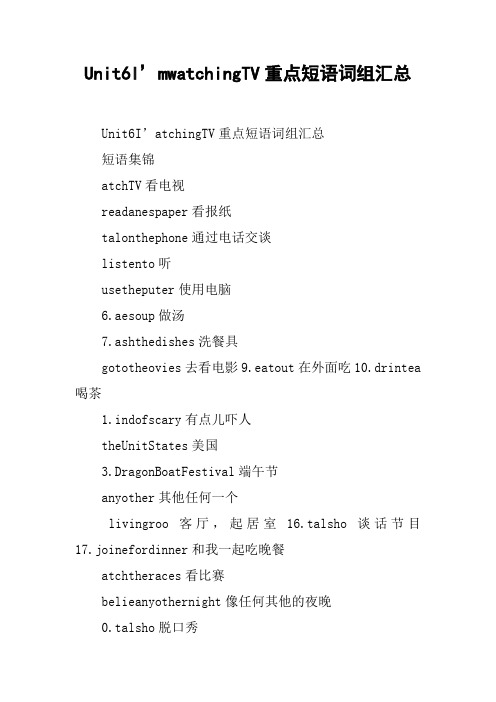
Unit6I’mwatchingTV重点短语词组汇总Unit6I’atchingTV重点短语词组汇总短语集锦atchTV看电视readanespaper看报纸talonthephone通过电话交谈listento听usetheputer使用电脑6.aesoup做汤7.ashthedishes洗餐具gototheovies去看电影9.eatout在外面吃10.drintea 喝茶1.indofscary有点儿吓人theUnitStates美国3.DragonBoatFestival端午节anyother其他任何一个livingroo客厅,起居室16.talsho谈话节目17.joinefordinner和我一起吃晚餐atchtheraces看比赛belieanyothernight像任何其他的夜晚0.talsho脱口秀1.talith/to和某人交谈2.talabout谈论某事23.aingofanial一种动物24.allindsofanials各种各样的动物atchthesoccergaeonTV通过电视看足球Notuch=Nothinguch没什么hostfaily借宿的人家noplaceliehoe金窝银窝不如自己的狗窝用法集萃:现在进行时:定义:现在进行时表示现在或现阶段正在进行或发生的动作或存在的状态。
构成:助动词be+v.ing。
时间状语标志:no,attheoent,loo,listen或“It's+某一时刻”等。
句式结构:①肯定句:主语+a/is/are+v.ing.②否定句:主语+a/is/are+not+v.ing③一般疑问句:A/Is/Are+主语+v.ing?肯定、否定回答:yes,Ia./No,I'not.yes,…is./No,…isn't.yes,…are./No,…aren't.④特殊疑问句:特殊疑问词+a/is/are+主语+v.ing?v.ing的构成方法:①规则动词后加ing。
七年级英语《ImwatchingTV》知识点

七年级英语《ImwatchingTV》知识点七年级英语《Im watching TV》知识点一、重点短语1. watch TV 看电视2. read a newspaper 看报纸3. tal n the phne 通过电话交谈4. listen t usic 听音乐5. use the cputer 使用电脑6. ae sup做汤7. wash the dishes =d the dishes洗餐具8. the Dragn Bat Festival 龙舟节,端午节9. the bat races 划船比赛二、用法集萃1. —What + be+ 主语+ ding?—主语+ be + ding sth. ……正在做什么?……正在做某事。
2. I’d lve / lie t d sth. 我愿意做某事。
其他任何一个……希望做某事 3. an ther + 可数名词单数 4. wish t d sth./hpe t d sth三、重点句型1. —What are u ding? —I’ watching TV. 你在做什么?我在看电视。
2. —What’s she ding? —She’s washing her clthes. 她在做什么?她在洗她的衣服。
3. —What are the ding? —The’re listening t a CD.他们在做什么?他们在听一张CD 唱片。
4. —Are u ding ur hewr? —es, I a. / N, I’ nt. I’ cleaning r. 你在做你的家庭作业吗?是的',我在做。
/ 不,我没有。
我在打扫我的房间。
5. D u want t in e fr dinner? 你想和我一起吃晚饭吗?6. He’s taling n the phne t his cusin in Shenzhen.朱辉正在和他深圳的阿姨打电话。
7. Zhu Hui isses his fail and wishes t have his ’s delicius zngzi.朱辉思念他的家人并希望吃上他妈妈的可口粽子。
Unit 6 I’m watching TV. 总结(短语及语法)

Unit 6 I’m watching TV.必背短语1. with 是一个介词,with短语不能做主语2. do one’s homework 做(某人的)家庭作业(此处的do是“做”的意思)通过电话交谈4. watch look see read 的大致区别:(1)watch 观看,看 watch TV 看电视 watch a football game 看一场足球比赛(2)see 看见(看的结果) I can see the bird in the tree.(3)look 看(看的动作) Please look at the blackboard.(3)read 阅读,读书,读报(book,newspaper,magazine)She is reading a story.5.go to the movies 去看电影6.listen to a CD:听一张CD唱片7.read a newspaper:读一份报纸8.watch TV :看电视9.wash the dishes:洗碗碟e the computer :使用电脑 use sth. to do sth.用.......来做........11.Clean:(1)干净的(2)打扫 clean the room The room is very clean12. That sounds good. 那听起来不错13.Not much:没干什么,没什么事14.join sb. 加入某人中 join sb. for sth.:与某人一起做.......15.eat out 出去吃16.Let’s meet at my home first.17.打电话用语考点解析1、all 、 also 、often 、never 等副词应该放在be动词,情态动词及助动词之后,行为动词之前。
He never stop talking. I often get up at six.We are all students. The boys can also swim.They all like English. Lions also come from South Africa.2. thanks for sth 谢谢某物 Thanks for your letter.thanks for doing sth 谢谢做了某事 Thanks for joining us.3. some of + 宾格代词(us / you /them ) some of us 我门当中的一些人Some of +名词复数 some of the students 一些学生4. in the first /second /next / last photo 在第一/第二/下一个/最后一张照片里5. at school 在学校 at home 在家 at the pool 在游泳池6. be with sb 与某人一起 He is with his parents. 他和他的父母在一起。
Unit 6 I'm watching TV知识点总结
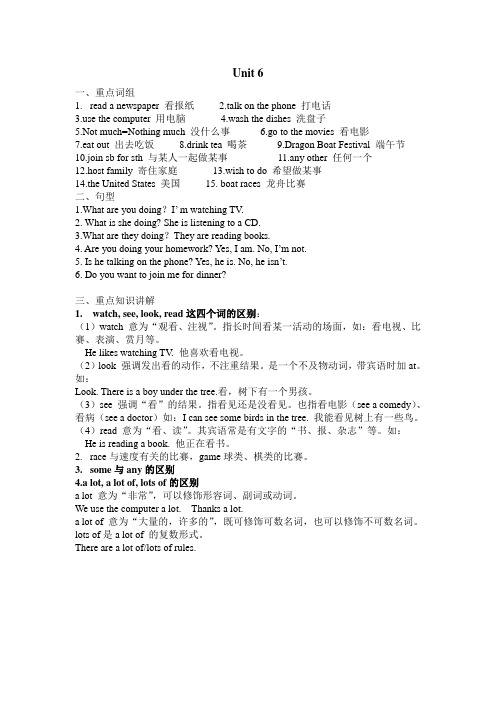
Unit 6一、重点词组1.read a newspaper 看报纸2.talk on the phone 打电话e the computer 用电脑4.wash the dishes 洗盘子5.Not much=Nothing much 没什么事6.go to the movies 看电影7.eat out 出去吃饭8.drink tea 喝茶9.Dragon Boat Festival 端午节10.join sb for sth 与某人一起做某事11.any other 任何一个12.host family 寄住家庭13.wish to do 希望做某事14.the United States 美国15. boat races 龙舟比赛二、句型1.What are you doing?I’ m watching TV.2. What is she doing? She is listening to a CD.3.What are they doing?They are reading books.4. Are you doing your homework? Yes, I am. No, I’m not.5. Is he talking on the phone? Yes, he is. No, he isn’t.6. Do you want to join me for dinner?三、重点知识讲解1. watch, see, look, read这四个词的区别:(1)watch 意为“观看、注视”。
指长时间看某一活动的场面,如:看电视、比赛、表演、赏月等。
He likes watching TV. 他喜欢看电视。
(2)look 强调发出看的动作,不注重结果。
是一个不及物动词,带宾语时加at。
如:Look. There is a boy under the tree.看,树下有一个男孩。
Unit 6 I’m watching TV重点短语词组汇总
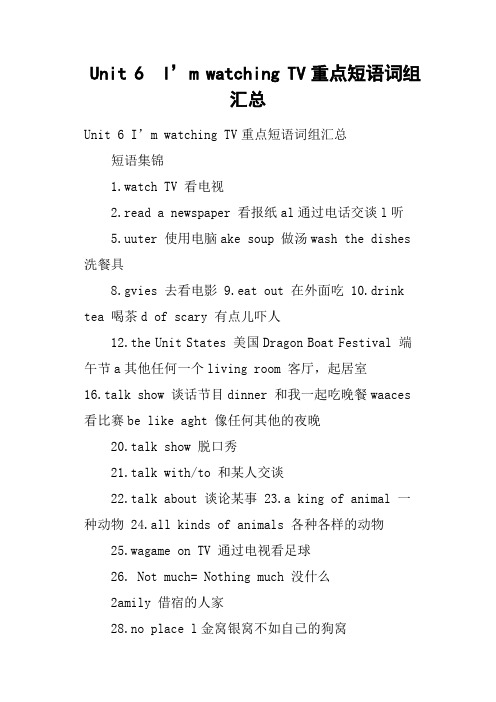
Unit 6 I’m watching TV重点短语词组汇总Unit 6 I’m watching TV重点短语词组汇总短语集锦1.watch TV 看电视2.read a newspaper 看报纸al通过电话交谈l听5.uuter 使用电脑ake soup 做汤wash the dishes 洗餐具8.gvies 去看电影 9.eat out 在外面吃 10.drink tea 喝茶d of scary 有点儿吓人12.the Unit States 美国Dragon Boat Festival 端午节a其他任何一个living room 客厅,起居室16.talk show 谈话节目dinner 和我一起吃晚餐waaces 看比赛be like aght 像任何其他的夜晚20.talk show 脱口秀21.talk with/to 和某人交谈22.talk about 谈论某事 23.a king of animal 一种动物 24.all kinds of animals 各种各样的动物25.wagame on TV 通过电视看足球26. Not much= Nothing much 没什么2amily 借宿的人家28.no place l金窝银窝不如自己的狗窝用法集萃:现在进行时:1.定义:现在进行时表示现在或现阶段正在进行或发生的动作或存在的状态。
2.构成:助动词be(is/am/are)+ v. ­ing。
时间状语标志: now, alook, listen 或“It's+某一时刻”等。
句式结构:①肯定句:主语+ am/is/are + v. ­ing.②否定句:主语+ am/is/are + not + v.­ing③一般疑问句: Am/Is/Are +主语+v.­ing?肯定、否定回答:Yes, I am./No, I'… is./No,… isn'… are./No, … aren'④特殊疑问句:特殊疑问词+ am/is/are +主语+ v. ­ing?v. ­ing的构成方法:①规则动词后加­ing。
七年级英语-unit_6_I'm_watching_TVAllMMA
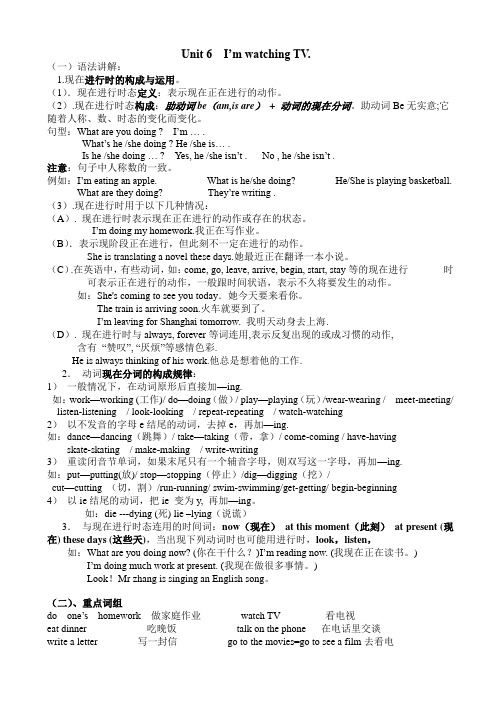
Unit 6 I’m watching TV.(一)语法讲解:1.现在进行时的构成与运用。
(1).现在进行时态定义:表示现在正在进行的动作。
(2).现在进行时态构成:助动词be(am,is are)+ 动词的现在分词。
助动词Be无实意;它随着人称、数、时态的变化而变化。
句型:What are you doing ? I’m … .What’s he /she doing ? He /she is… .Is he /she doing … ? Yes,he /she isn’t . No , he /she isn’t .注意:句子中人称数的一致。
例如:I’m eating an apple. What is he/she doing? He/She is playing basketball.What are they doing? They’re writing .(3).现在进行时用于以下几种情况:(A). 现在进行时表示现在正在进行的动作或存在的状态。
I’m doing my homework.我正在写作业。
(B).表示现阶段正在进行,但此刻不一定在进行的动作。
She is translating a novel these days.她最近正在翻译一本小说。
(C).在英语中,有些动词,如:come, go, leave, arrive, begin, start, stay等的现在进行时可表示正在进行的动作,一般跟时间状语,表示不久将要发生的动作。
如:She's coming to see you today.她今天要来看你。
The train is arriving soon.火车就要到了。
I’m leaving for Shanghai tomorrow. 我明天动身去上海.(D). 现在进行时与always, forever等词连用,表示反复出现的或成习惯的动作, 含有“赞叹”, “厌烦”等感情色彩.He is always thinking of his work.他总是想着他的工作.2.动词现在分词的构成规律:1)一般情况下,在动词原形后直接加—ing.如:work—working (工作)/ do—doing(做)/ play—playing(玩)/wear-wearing / meet-meeting/ listen-listening / look-looking / repeat-repeating / watch-watching2)以不发音的字母e结尾的动词,去掉e,再加—ing.如:dance—dancing(跳舞)/ take—taking(带,拿)/ come-coming / have-having skate-skating / make-making / write-writing3)重读闭音节单词,如果末尾只有一个辅音字母,则双写这一字母,再加—ing.如:put—putting(放)/ stop—stopping(停止)/dig—digging(挖)/cut—cutting (切,割)/run-running/ swim-swimming/get-getting/ begin-beginning4)以ie结尾的动词,把ie 变为y, 再加—ing。
人教英语U6 I’m watching TV知识点

U6 I’m watching TV1.现在进行时:(每个用法下面有同标号例句)①主要用于表示现在正在进行的动作(标志性词汇有now ,listen ,look )②有时也可表示现阶段正在进行的动作③也可表示一段时间内持续不段的动作肯定句句式:主语+be动词+v.-ing(+宾语+其它)其中be动词(is\am\are )与主语在人称和数上保持一致在句型转换中与含有be动词的一般现在时句子的变化规则相同①eg: 肯定句:I’m watching TV, now我现在正在看电视。
否定句:I’m not watching TV. 我没在看电视(be动词后加not)一般疑问句:Are you watching TV ?你正在看电视吗?(be 动词提前)肯定回答:Yes , I am 是的,我在看。
否定回答:No, I’m not .不,我没看。
你正在做什么?—I’m reading books.②eg:My sister is reading the book these days.我姐姐这些天正在读这本书③eg:He is doing homework in the morning .一上午,他一直在做作业。
2. 动词的现在分词构成(现在进行时中的v.-ing为动词原形的现在分词形式):①一般情况直接在动词后加-ing.eg: look—looking ; watch —watching②以不发音的字母e结尾的动词,去掉e再加-ing .eg: have— having, dance— dancing , make —making,take— taking.leave —leaving ,drive—driving……③以重读闭音节结尾只有一个辅音字母的动词,双写这个辅字母,再加-ing.eg: get—getting, forget —forgetting , swim —swimming , begin— beginning, Run— running, cut —cutting,put— putting, stop —stopping3.read a newspaper(C.)表份数时为可数名词,(u.)表张数时为不可数名词看报纸 a piece of newspaper.一张报纸read books \a book看书,4. talk on the phone通过电话交谈5. make soup做汤6. use the computer使用电脑use v.使用(做谓语,表示用途) use sth.to do sth. 用某物去做某事eg: he is using the knife cut an apple.他正用那把刀切一个苹果with prep.(做状语,表方式)eg: I write a pen .我用钢笔写字useful有用的adj. 现在分词using7.打电话用语:hello? This is Jenny.喂?我是珍妮。
Unit 6 I’m watching TV课文及语法重点

Unit 6 I’m watching TV.(讲义)Words and Expressionsnewspaper /'njuːz,peɪpə/ n. 报纸read a newspaper 看报纸use /juːz/ v.使用;运用soup /suːp/ n.汤make soup 做汤wash /wɒʃ/ v.洗movie /'muːvi/ n.电影go to the movies 看电影just /dʒʌst/ adv.只是;恰好eat out 出去吃饭house /haʊs/ n. 房子drink /drɪŋk/ v. 喝n.饮料tea /tiː/ n. 茶;茶叶drink tea 喝茶tomorrow /tə'mɒrəʊ/ adv. 在明天n. 明天;未来pool /puːl/ n. 游泳池;水池shop /ʃɒp/ v. 购物n. 商店supermarket /'suːpə(r),mɑː(r)kət/ n. 超市man /mæn/ n. 男人;人race /reɪs/ n. 竞赛host /həʊst/ n. 主人;东道主study /'stʌdi/ v. & n.学习;研究state /steɪt/ n.州the United States /ju'naɪtɪd 'steɪts/ (of America) (abbr. the US, the USA)美国;美利坚合众国American /ə'merɪkən/ adj. 美国的;美洲的n. 美国人;美洲人dragon /'drægən/ n. 龙Dragon Boat Festival 端午节any /'eni/ adj.任何的;任一的pron.任何;任一other /'ʌðə(r)/ adj.另外的;其他的pron.另外的人(或物)young /jʌŋ/ adj.幼小的;年轻的child /tʃaɪld/ n. 儿童(pl. children /'tʃɪldrən/)miss /mɪs/ v. 怀念;思念wish /wɪʃ/ v. 希望delicious /dɪ'lɪʃəs/ adj. 可口的;美味的still /stɪl/ adv.还;仍然living /'lɪvɪŋ/ room 客厅Steve /sti:v/ 史蒂夫(男名)Laura /'lɔ:rə/ 劳拉(女名)Role-playJenny: Hello? This is Jenny.Laura: Hi, Jenny. It’s Laura her e.Jenny: Oh, hi, Laura. What are you doing?Laura: Not much. I’m just washing my clothes. What about you?Jenny: I’m watching TV. Do you want to join me for dinner?My parents aren’t at home. We can eat out.Laura: Yeah. I’d love to.Jenny: Let’s meet at my home first. Come at half past six.Laura: OK. See you then.Grammar FocusWhat are you doing? I’m watching TV.What’s she doing?She’s washing her clothes.What are they doing? They’re listening to a CD.Are you doing your homework? Yes, I am./No, I’m not. I’m cleaningmy room.Is he reading a newspaper? Yes, he is./No, he isn’t. He’s playingbasketball.Are they using the computer? Yes, they are./No, they aren’t.The y’re exercising.练习一、用所给动词的适当形式填空1. Listen! A baby _____________(cry) in the room.2. Jim _____________ (fly) a kite now.3. Lucy _____________ (read) an interesting book these days.4. Be quiet! My grandpa _____________ (sleep).5. Mrs. Black _____________ (like) going shopping on weekends.6. Allan _____________ (get) up at 7:00 a.m. every day.二、句式变换7. They’re exercising. (变成一般疑问句)_______________________________________________________8. Is he reading a newspaper? (进行否定回答)_______________________________________________________9. Tom and Jerry are looking for you. (对划线部分提问)_______________________________________________________10. Tom and Jerry are looking for you. (对划线部分提问)_______________________________________________________ReadingRead the TV report and answer the questions.1. Why are Zhu Hui’s family watching boat races and making zongzi?2. Does Zhu Hui like his host family? What does he think about his home in China?Today’s story is about Zhu Hui, a student from Shenzhen. He’s now studying in the United States. He’s living with an American family in New York. Today is the Dragon Boat Festival. It’s 9:00 a.m. and Zhu Hui’s family are at home. His mother and aunt are making zongzi. His dad and uncle are watching the boat races on TV.Is Zhu Hui also watching the races and eating zongzi? Well, it’s 9:00 p.m. in New York, and it’s the night before the festival. But there isn’t a Dragon Boat Festival in the US, so it’s like any other nightfor Zhu Hui and his host family. The mother is reading a story to her young children. The father is watching a soccer game on TV. And what’s Zhu Hui doing? He’s talking on the phone to his cousin in Shenzhen. Zhu Hui misses his family and wishes to have his mom’s delicious z ongzi. Zhu Hui likes New York and his host family a lot, but there’s still “no place like home”.Exercises一、根据首字母填空或用单词的适当形式填空1. Many parents are strict(严格) with their c__________.2. The fish tastes(尝起来) very d__________.3. Gina is an A__________ girl. She is from America.4. Tom is very y__________, but he can look after himself well.5. Some __________ (man) are watching a football game on TV.6. You can take any __________(book) on the desk.7. Jim is taller(更高) than any other__________ (student) in the class.二、单选( )8.—Where is Kate?—She ______ TV in the living room.A. watchB. watchingC. is watchingD. is watch( )9.—Bob, would you like to play basketball with us?—______.A. No, I can’tB. I don’t want toC. Yes, pleaseD. Yes, I’d love to( )10.—What are you going to do tomorrow?—______. Do you have any ideas?A. SorryB. Nothing muchC. No problemD. Thank you( )11.She loves her daughter ______.A. veryB. a lot ofC. a lotD. lots of( )12.—Nancy, here is your new dress for your birthday.—Thank you, mom. It’s ______ the gift(礼物) I want.A. justB. stillC. onlyD. always( )13.It’s 11:00 p.m. now, but her mother is ______ doingsome ______.A. just; washingB. only; washingC. still; washD. still; washing( )14.Sometimes pandas are sent(被送往) to ______countries.A. the otherB. otherC. oneD. any( )15.There are two books on the desk. ______ is Tom’s and______ is Mary’s.A. One; oneB. One; otherC. One; the otherD. Some; the other( )16.I wish ______ around the world.A. travel(旅行)B. travelsC. to travelD. traveling( )17.How about______ us ______ the dinner?A. join; toB. join; forC. joining; atD. joining; for三、翻译18. 他们正在通过电话聊天。
初一第七讲 unit 6 i am watching TV

They are eating out.
T: What is he doing? S: He is …..
He is drinking tea.
现在进行时
含义:表现在正在进行或一段时间内正在进行
的动作。
标志词:now, listen,look,at 8 o’clock等
构
成
肯定句:be (am, is, are)+动词-ing I am watching TV now. 否定句:be +not +动词-ing I am not watching TV now.
练一练
dancing
cleaning
writing
lying
running
sleeping
你 选 我
选
name place 湘江1 activities 游泳 1 2 卖报纸
打dota 3 打弟弟4 跳舞 5
1
2
侯家塘 2
厕所3
3
4
澡堂4
思齐5
习题训练
1.Is she____ B something now? A. eats B +主语+动词-ing ? Am I watching TV now? 回答:肯定:Yes,主语 +be 否定:No,主语+be +
动词-ing变化规 则
watch---watching drink---drinking
dance---dancing
run---running lie---lying
5. --Where is your mom? A --She is _____in the ketch. A.is cooking B. cooks C. cooking
人教新目标unit6 i27m watching_tv知识点
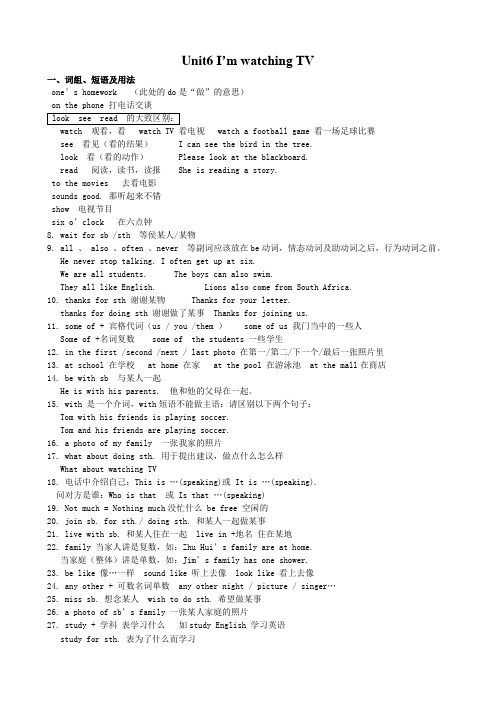
Unit6 I’m watching TV一、词组、短语及用法one’s homework (此处的do是“做”的意思)on the phone 打电话交谈watch 观看,看 watch TV 看电视 watch a football game 看一场足球比赛see 看见(看的结果) I can see the bird in the tree.look 看(看的动作) Please look at the blackboard.read 阅读,读书,读报 She is reading a story.to the movies 去看电影sounds good. 那听起来不错show 电视节目six o’clock 在六点钟8. wait for sb /sth 等侯某人/某物9. all 、 also 、often 、never 等副词应该放在be动词,情态动词及助动词之后,行为动词之前。
He never stop talking. I often get up at six.We are all students. The boys can also swim.They all like English. Lions also come from South Africa.10. thanks for sth 谢谢某物 Thanks for your letter.thanks for doing sth 谢谢做了某事 Thanks for joining us.11. some of + 宾格代词(us / you /them ) some of us 我门当中的一些人Some of +名词复数 some of the students 一些学生12. in the first /second /next / last photo 在第一/第二/下一个/最后一张照片里13. at school 在学校 at home 在家 at the pool 在游泳池 at the mall在商店14. be with sb 与某人一起He is with his parents. 他和他的父母在一起。
unit6iamwatchingtv知识点

U n i t6I a m w a t c h i n g T V知识点(总2页)--本页仅作为文档封面,使用时请直接删除即可----内页可以根据需求调整合适字体及大小--Unit 6 I am watching TV 知识点1,reading a newspaper看报纸。
(1)“read”读,阅读,后面通常接书籍,报等。
Watch 后通常接比赛(game),电视(TV)等,look 通常与“at”连用,指盯着看。
See ,后接人,物,表示无意识的看。
如:my uncle likes ( )story book every wacthing B reading C seeing D looking at(2)newspaper,可数名词,意为报纸。
例:my dad _______every morning.我爸爸每天早上都看报纸。
2,He is using the computer他正在使用电脑。
Use 做动词,意为“使用,运用”其现在分词形式为“using”.常用词组有:(1)use ...to do sth.用。
去做。
例:can you use the computer.你会使用电脑。
(2)use up 用完,用光。
Don`t use up all thepapers.不用用光所有的纸。
做名词,意为:用途,使用。
例:More and more people know the use of computer。
越来越多的人懂得了电脑的用途。
3,do you want to go to movies你想去看电影吗go to the movies 去看电影,为美式英语常用语。
英式英语为:go to the cinema.go+活动性名词,表示“去做某事”如:go to the class去上课。
go +V-ing形式,表示“去进行这一活动”例:go shopping去购物 go swimming 去游泳 go fishing去钓鱼4,this is Jenny我是珍妮。
- 1、下载文档前请自行甄别文档内容的完整性,平台不提供额外的编辑、内容补充、找答案等附加服务。
- 2、"仅部分预览"的文档,不可在线预览部分如存在完整性等问题,可反馈申请退款(可完整预览的文档不适用该条件!)。
- 3、如文档侵犯您的权益,请联系客服反馈,我们会尽快为您处理(人工客服工作时间:9:00-18:30)。
Unit 6 重点短语及句型背诵
(留存备用考前复习)
Key Phrases重点短语
1.watch TV 看电视
2.read a newspaper 看报纸
3.talk on the phone 通过电话交谈
4.listen to a CD 听CD
ethe computer 使用电脑
6.make soup 做汤
7.wash the dishes 清洗餐具 8.tomorrow evening 明天晚上
9.make dinner 做晚饭 10.eat out 出去吃饭
11.go to the movies 看电影 12.drink tea 喝茶
13.in a pool 在(游泳)池里 14.in the United States 在美国
15.Dragon Boat Festival 端午节 16.make zongzi 包粽子
17. host family 寄宿家庭 18.any other night 其他任何一个晚上
19. living room 客厅 20. watch the boat races on TV 看电视上的龙舟比赛21. no place like home 没有像家一样的地方
Key Sentences 重点句型
1.That sounds good.那听起来不错。
2.Hello? This is Jenny.喂? 我是妮。
3.Hi,Jenny.It's Laura here.嗨,珍妮,我是劳拉。
4.What are you doing? 你在干什么?
5.Not much. I'm just washing my clothes.没做什么。
我只是在洗衣服。
6.Do you want to join me for dinner? 你想跟我一起吃晚饭吗?
7.Let's meet at my home first. Come at half past six.我们先在我家见面。
六点半来吧。
8.He's now studying in the United States.他目前在美国学习。
9.His dad and uncle are watching the boat races on TV.他的爸爸和叔叔正在看电视上的龙舟比赛。
10.But there isn't a Dragon Boat Festival in the US, so it's like any other night for Zhu
Hui and his host family.但是美国没有端午节,所以对于朱辉和他的寄宿家庭
来说,它就和其他任何一个平常的夜晚一样。
11.The mother is reading a story to her young children.母亲在给幼小的孩子们读故事。
12.Zhu Hui misses his family and wishes to have his mom's delicious zongzi.朱辉想念他的家人
并渴望吃到他母亲包的美味粽子。
Unit 6 重点短语及句型默写
姓名:日期: .
Key Phrases重点短语
1. 看电视
2. 看报纸
3. 通过电话交谈
4. 听CD
5. 使用电脑
6. 做汤
7. 清洗餐具
8. 明天晚上
9. 做晚饭 10. 出去吃饭
11. 看电影 12. 喝茶13. 在(游泳)池里 14. 在美国15. 端午节 16. 包粽子
17. 寄宿家庭 18. 其他任何一个晚上
19. 客厅 20. 看电视上的龙舟比赛
21. 没有像家一样的地方
Key Sentences 重点句型
1. .那听起来不错。
2.Hello? .喂? 我是妮。
3.Hi,Jenny. .嗨,珍妮,我是劳拉。
4. ? 你在干什么?
5. . I'm just .没做什么。
我只是在洗衣服。
6.Do you ? 你想跟我一起吃晚饭吗?
7.Let's . Come .我们先在我家
见面。
六点半来吧。
8. .他目前在
美国学习。
9.His dad and uncle .他的爸爸和叔叔正
在看电视上的龙舟比赛。
10.But in the US, so
for Zhu
Hui and .但是美国没有端午节,所以对于朱辉和他的寄宿家庭
来说,它就和其他任何一个平常的夜晚一样。
11.The mother .母亲在给幼小
的孩子们读故事。
12.Zhu Hui
and .朱辉
想念他的家人并渴望吃到他母亲包的美味粽子。
